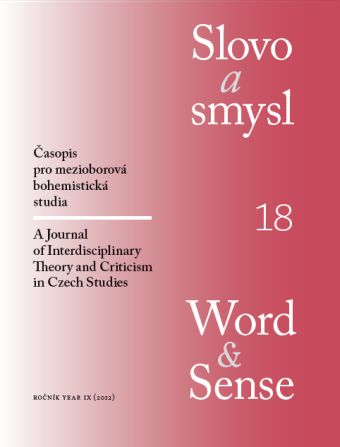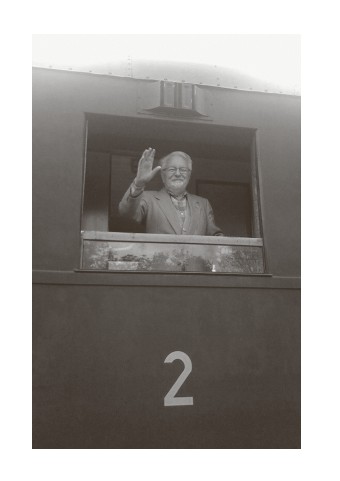Editorial
The realm of literature is a realm of texts, of their potential links, and of the ways of reading and understanding them. It does include events, too – but rather as a secondary element, outlined somewhere in the background, in the field of culture or „literary life“. Still, even the realm of literature does now and then admits an indubitable event; and one such is the fact that on October 22, 2012, Lubomír Doležel has reached ninety years of age – in enviable strength and unique vivacity of mind. This event has been appropriately chosen as the dominant thematic guideline of this issue of Slovo a smysl / Word and Sense, intended as a gesture of honor – a Festschrift.
When we look for Czech literary scholars who have provided a productive source of inspiration for international literary research, the first figure to come up is Jan Mukařovský of the 1930s and 1940s. Mukařovský’s citation index would be not merely extensive but also representative in terms of the „big names“ that have looked to him for inspiration. We can also take a little pride in the Czech origins of René Wellek and Peter Demetz, even though both have produced their major works only after they left this country. And starting with the 1970s, the dominating figure of an imaginary citation index of Czech literary scholars in global context – and for decades! – is, no doubt, Lubomír Doležel. While Doležel has also written a substantive part of his oeuvre as an exile in Canada (from where he has permanently returned to the Czech Republic in 2009), he is clearly the most representative personality to come out of our country to help form the contemporary theory of literature in its global context. He has become a participant of the process at the very front of the imaginary peloton that has defined for decades both the subject and the methodology of international literary theory. No analogy will be perfect, yet I trust one can say that at the field of literary scholarship Doležel represents the same degree of „global impact“ as Milan Kundera at the field of creative writing. Apart from the numerous awards and honorary doctorates, this is also clearly recognized by the 1996 Doležel Festschrift, edited by Calin Andrei Mihailescu and Walid Hamarneh, which was published as Fiction Updated: Theories of Fictionality, Narratology, and Poetics by the University of Toronto Press and contains contributions by Ruth Ronen, Nicholas Rescher, Felix Martinez‑Bonati, Siegfried J. Schmidt, Cesare Segre, Uri Margolin and Gerald Prince. One could also point to the frequent references to Doležel in the works of Umberto Eco, Thomas Pavel, David Herman or Marie‑Laure Ryan.
In his long and productive scholarly career, Doležel had the occasion for several „changes of paradigm“; thanks to this, he has influenced a whole gamut of disciplines in the Humanities. In the 1950s, he started his career as a linguist. However, the chosen specialty – stylistics – took him very quickly to areas overlapping with literature. Both his first book, the monograph On the Style of Modern Czech Prose: Text Construction (Czech Academy of Sciences Publications, Prague 1960), as well as the six chapters he supplied for the collective publication A Short Book on the Language and the Style of Contemporary Czech Fiction (Prague 1961), approached style as a semantic category, relevantly defined not by the employment of certain linguistic means but rather by its expressive aims. It is already here that Doležel has offered a basic narrative speech typology, as well as an analysis of certain specific narrative procedures, such as the skaz narrative. Simultaneously he was involved with mathematical linguistics and cybernetics. In the fall of 1968 he flew to Canada. The country extended to him a permanent stay permit, the University of Toronto appointed him a professor of Czech language and literature. Under these new conditions he published his 1973 Narrative Modes in Czech Literature (University of Toronto Press). The book both developed and modified Doležel’s previous research on the types of speech and utterances within fiction, and linked them to an analysis inspired by the newly constituted discipline of narratology (as it was called following Todorov’s suggestion). In the late 1970s, Doležel adopted the framework of analytic philosophy, modal logic and speech acts theory. His papers and articles were now published by the most prestigious journals in the discipline, such as Poetics Today, Style, Poetics, or Communications, and included within prominent collections of essays. Thus he progressed, starting from Slavic studies and via comparative studies, towards a general theory of literature, narratology and theory of fictional worlds. He offered a full survey of the transformations of thought regarding literature in his 1990 Occidental Poetics: Tradition and Progress (University of Nebraska Press). A synthesis of the many years of productive research into the issues of possible and fictional worlds was rendered in his 1998 Heterocosmica: Fiction and Possible Worlds (Johns Hopkins University Press). The most recent focus of his interest so far has become the relationship between historical fiction of the post‑modern period and historiography; a comprehensive treatment was provided in his 2010 book on the Possible Worlds of Fiction and History: The Postmodern Stage (Johns Hopkins University Press; in this case, the Czech version has preceded the English publication by two years), where he continues to develop and reconsider the propositions that constitute his overall theory of fictional worlds.
The majority of the essays in this issue is linked to Doležel’s work by its choice of topic, methodology, or general inspiration. However, this was not set as an obligatory part of the proposal. As is easily apparent, Doležel’s work is of a distinctly dialogical nature. While his texts are full of diagrams, tables, binary oppositions and/or triads and while they demonstrate clear effort to order, classify, distinguish, typify and capture in precise formulations, such an attitude is not bound to present its issues as closed, solved once and for all, and intellectually sterilized. On the contrary: it provokes reconsideration, a search for alternative patterns or distinctions, and also search for regions where the propositions, as given, prove unhelpful. This is where I see Doležel’s distinct strength. His analyses are not meant for rote learning, for repetitive recycling, for paraphrasing and abstracting at higher and higher levels. Doležel’s concepts are as clear‑cut as his solutions, and speak for themselves. One need not agree with everything, yet this „seeing it differently“ is born thanks to Doležel’s stimulative suggestions and thanks to the argumentative coherence and methodological purity of his solutions. When Doležel spits fire onto Terry Eagleton or the living conditions in Mexico, it is readily apparent why he does so and in what kind of context. In the current flood of theoretical writing which may and wants to mean almost anything, Doležel’s way of writing is a true beacon.
David Herman, the author with perhaps the most impact in present‑day narratology, has kindly contributed with a paper included here in the original English. The paper inquires into the relationship between the narrative and the receiving mind, employing the concepts of narrative world‑making, constitutively formed by concretizations of the questions When?, What?, Where?, Who?, How? and Why?. There follows Jiří Hrabal’s study on the narratological concept of perspective as related to the imagininative representation of space in a literary work; the paper shows that language is capable of presenting space both in a perspectivized and an aperspectivized manner, and that perspectivization is not necessarily a cause of the focalization of a narrative. Petr Málek in his essay on Čapek’s detective stories focuses on the self‑reflection of literature as such in these pieces and looks in detail at some analogies between the positions of a detective and of a reader. The next two contributions, by Vladimír Svatoň and Martin Humpál, return to Doležel’s concept of speech and utterance types, as employed by the narrative. The papers formulate some general conclusions regarding this topic, and point out the differences between individual characters’ utterances, as well as between characters’ utterances as a whole and narrator’s utterances as a whole, in various languages and cultures. The issue also includes reviews, an essay on the position of Czech Studies in South Korea, and a translation of Uri Margolin’s study The What, the When, and the How of Being a Character in Literary Narrative which offers a complex interpretation of literary character from the viewpoint of narratology inspired by cognitive science. Next we offer a long interview with the energetic nonagenarian, focusing primarily on personal aspects; since Professor Doležel is currently finalizing his memoirs, intending to stop just before his return to this country, the interview takes from there and concentrates on what happened after the return.
Petr A. Bílek


